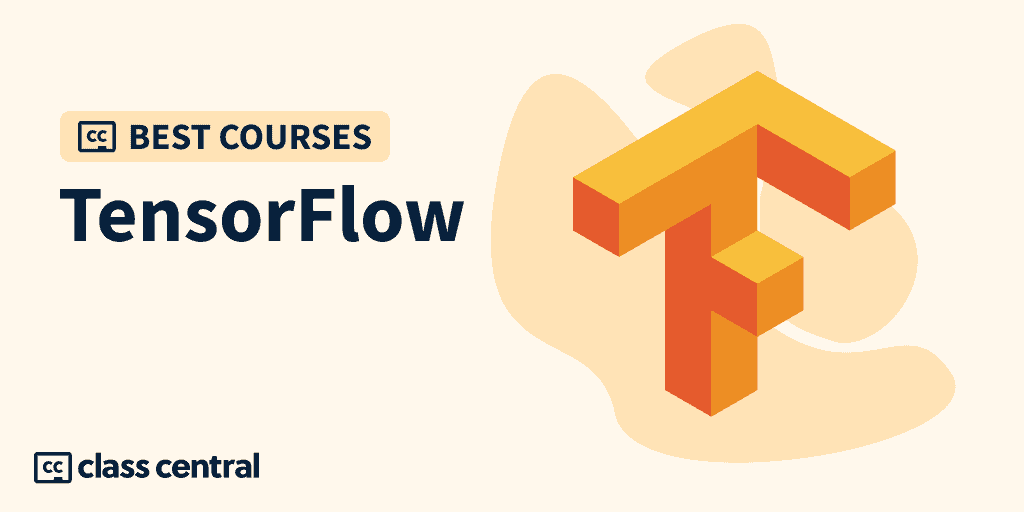9 Best TensorFlow Courses for 2025
An in-depth guide on the best online courses for learning TensorFlow. Learn Google’s popular ML library!

TensorFlow is a very popular free and open-source machine learning library created by Google.
In this Best Courses Guides (BCG), I’ve used Class Central’s catalog of over 200K courses to find the best online courses for learning TensorFlow.
If you’d like to know how I chose these courses, you can find my methodology below.
Click on the shortcuts for more details:
- Top Picks
- What is TensorFlow?
- Why You Should Trust Us
- Courses Overview
- How We Made Our Picks and Tested Them
Here are our top picks
Click to skip to the course details:
What is TensorFlow?
TensorFlow is a comprehensive open source library for machine learning (ML). Originally created at Google as an internal tool before being open sourced in 2015, it has become incredibly popular over the years as artificial intelligence gained prominence.
The reason why TensorFlow is one of the best libraries to implement machine learning applications, including deep learning, is its comprehensive, flexible ecosystem of tools and community resources. It allows researchers to push the state-of-the-art in ML and developers to easily build and deploy ML-powered applications.
According to PayScale, TensorFlow skills command salaries of over $100K in the US. One of the ways to prove yourself as a TensorFlow expert is to take the official TensorFlow Developer Certificate. If you pass the exam, you can join Google’s Certificate Network ensuring recruiters recognize your TensorFlow skills.
Why You Should Trust Us
Class Central, a Tripadvisor for online education, has helped 60 million learners find their next course. We’ve been combing through online education for more than a decade to aggregate a catalog of 200,000 online courses and 200,000 reviews written by our users. And we’re online learners ourselves: combined, the Class Central team has completed over 400 online courses, including online degrees.
Courses Overview
- The largest course in this guide has close to 300K enrollments
- In total, the courses account for 450K enrollments
- All courses are free or free-to-audit, except for one
- 5.2K people follow Class Central’s TensorFlow Courses
- The most represented provider is Coursera with 4 courses, whereas the rest are distributed over many different platforms.
Best Hands-On TensorFlow Course for AI Beginners (DeepLearning.AI)
For anyone completely new to machine learning (ML) or deep learning (DL) who wants to learn TensorFlow for AI, Introduction to TensorFlow for Artificial Intelligence, Machine Learning, and Deep Learning is a great starting point.
In this free-to-audit course, you’ll start with the basics of machine learning before diving into practical applications. Using TensorFlow, you’ll build neural networks to predict housing prices and classify clothing items from images. The course covers computer vision, convolutional neural networks, and handling complex real-world datasets. You’ll gain hands-on experience with Keras and develop skills in binary classification.
Designed for beginners with Python experience and high school-level math, this course provides a foundation in AI and deep learning techniques.
What you’ll learn:
- Fundamentals of machine learning and deep learning
- Building and training neural networks using TensorFlow
- Computer vision techniques and image classification
- Implementing convolutional neural networks for improved efficiency
- Handling complex datasets and performing binary classification
- Practical applications of AI in housing price prediction and image recognition.
| Organization | DeepLearning.AI |
| Provider | Coursera |
| Part of | DeepLearning.AI TensorFlow Developer Professional Certificate |
| Instructor | Laurence Moroney |
| Workload | 20 hours |
| Enrollments | 376K |
| Rating | 4.8 / 5.0 (19K) |
| Exercises | Quizzes and coding projects (for paying learners) |
| Certificate | Paid |
Best Tensorflow Certification Exam Prep Course (Udemy)
Offered by ZTM Academy, TensorFlow for Deep Learning Bootcamp aims to provide you with all the skills necessary to ace the TensorFlow Certification and truly stand out from the deep learning crowd!
This paid course is heavily project-based. You’ll do lots of coding exercises, where you’ll build machine learning models and projects that mimic real-life scenarios. More importantly, the course will guide you through TensorFlow, preparing you not only for the exam but also to use TensorFlow out in the world. Upon course completion, you’ll have the skill sets needed to develop modern deep learning solutions..
Proficiency in Python programming is required, and a basic understanding of machine learning is helpful but not strictly necessary. No previous TensorFlow knowledge is required!
What you’ll learn:
- Fundamental TensorFlow concepts and tensor operations
- Building and training neural networks for regression and classification tasks
- Implementing convolutional neural networks for computer vision applications
- Utilizing transfer learning techniques with pre-trained models from TensorFlow Hub
- Developing natural language processing models using recurrent neural networks
- Tackling time series forecasting problems
- Practical skills through three major projects: Food101 image classification, SkimLit medical abstract classification, and time series prediction
- Exam preparation strategies and post-certification career development.
| Organization | Zero To Mastery |
| Provider | Udemy |
| Instructors | Andrei Neagoie and Daniel Bourke (YouTube) |
| Level | Beginner |
| Workload | 64 hours |
| Enrollments | 73K |
| Rating | 4.6 / 5.0 (10K) |
| Exercises | Jupyter Notebook and three hands-on projects |
| Certificate | Paid |
Comprehensive Course Made By Tensorflow Themselves (TensorFlow)
Intro to TensorFlow for Deep Learning, created by Google’s TensorFlow team in collaboration with Udacity, offers a comprehensive introduction to deep learning with TensorFlow.
You’ll learn to build state-of-the-art image classifiers and work with large datasets. The course covers various neural network types, including Convolutional Neural Networks (CNNs) for image recognition and Recurrent Neural Networks (RNNs) for text generation. You’ll also explore transfer learning and Natural Language Processing (NLP).
Taught by Google Developer Advocates and industry experts, this hands-on course features high-quality video content and plenty of learning resources. It’s ideal for those with basic Python skills and algebra knowledge. By the end of this course, you’ll have all the necessary skills to develop your own AI applications.
What you’ll learn:
- Fundamentals of AI, machine learning, and deep learning
- Building and training neural networks for image classification
- Implementing CNNs for advanced image recognition tasks
- Applying transfer learning to improve model efficiency
- Natural Language Processing techniques and text generation with RNNs
- Optional introduction to TensorFlow Lite for mobile and IoT applications.
The course wraps up with an optional but recommended introduction to TensorFlow Lite, a lighter but still powerful version of TensorFlow for building machine learning apps on Android, iOS, and IoT devices, although it is actually a separate course on its own.
| Organization | TensorFlow |
| Provider | Udacity |
| Instructors | Magnus Hyttsten, Juan Delgado, and Paige Bailey |
| Level | Intermediate |
| Workload | 8 weeks |
| Exercises | Coding assignments in Google Colab |
| Certificate | None |
Best Course for Mastering TensorFlow 2 Workflow in Deep Learning Applications (Imperial)
Getting started with TensorFlow 2 offered by Imperial College London on Coursera teaches Python programmers with existing machine learning (ML) and deep learning (DL) knowledge how to build deep learning models using TensorFlow 2.
You’ll master an end-to-end workflow for developing TensorFlow models, including building, training, and evaluating using the Sequential API. This free-to-audit course course covers a wide range of applications, from image classification to sentiment analysis and generative language models.
With hands-on programming assignments and a capstone project focused on classifying street view house numbers, this intermediate-level course provides a comprehensive understanding of TensorFlow 2 for practical deep learning applications.
What you’ll learn:
- TensorFlow 2 installation, documentation navigation, and Google Colab usage
- Building and training models with Keras, including loss functions and optimizers
- Convolutional neural networks for image classification
- Model validation, regularization, and dropout techniques to prevent overfitting
- Saving, loading, and working with pre-trained TensorFlow models
- Developing deep learning classifiers for various applications, including satellite imagery and street view house numbers.
Besides offering a flurry of online courses on machine learning, Imperial also offers an online master’s degree in machine learning on Coursera.
| Institution | Imperial College London |
| Provider | Coursera |
| Part of | TensorFlow 2 for Deep Learning Specialization |
| Instructor | Kevin Webster |
| Level | Intermediate |
| Workload | 26 hours |
| Enrollments | 36K |
| Rating | 4.9 / 5.0 (558) |
| Exercises | Programming assignment in Jupyter Notebooks (for paying learners) |
| Certificate | Paid |
Best Quick-Start Course for TensorFlow and Deep Learning Fundamentals (Google)
If you’re here to see what the fuss with TensorFlow and deep learning is all about, this short 3-hour course will get you up to speed.
Learn TensorFlow and deep learning, without a Ph.D. distances itself from the technical jargon and instead teaches you the fundamental concepts.
It focuses on a few basic network architectures, including dense, convolutional, and recurrent networks, and training techniques such as dropout or batch normalization.
By the end of the course, you’ll have all the necessary bits and pieces needed to study deep learning in-depth.
What you’ll learn:
- Fundamentals of deep learning and neural networks
- Convolutional networks for image recognition tasks
- TensorFlow high-level API essentials
- Recurrent neural networks for text processing
- Practical applications including handwritten digit recognition and Shakespeare-style text generation
- Basics of model deployment using Google Cloud Machine Learning.
| Institution | |
| Instructor | Martin Görner |
| Level | Beginner |
| Material | Annotated slides and codelab articles |
| Workload | 3 hours |
| Certificate | None |
Best Tensorflow Course for Novices with Applications (IBM)
In this TensorFlow course by IBM, you will learn the basic of TensorFlow — from the main functions, to operations, and to the execution pipeline — and start building your own deep learning application!
Deep Learning with Tensorflow begins by teaching you the fundamentals of machine learning (curve fitting, regression, classification) and then applies them to the deep learning world specifically. You’ll learn all about the intricacies of deep neural networks as well as the different types of architectures like convolutional networks, recurrent networks, and autoencoders.
To take this course, all you need is prior experience in Python programming.
What you’ll learn:
- TensorFlow basics and implementation of fundamental machine learning algorithms
- Building and training CNNs for image recognition tasks
- Developing RNNs for sequential data processing and natural language processing
- Implementing unsupervised learning models with a focus on Restricted Boltzmann Machines
- Creating Autoencoders for dimensionality reduction
- Optional: Scaling model training using IBM Watson Studio with multi-CPU or GPU runtimes.
| Institution | IBM |
| Provider | edX |
| Part of | Deep Learning Professional Certificate |
| Instructors | Saeed Aghabozorgi, Romeo Kienzler, and Samaya Madhavan |
| Level | Intermediate |
| Workload | 16–20 hours |
| Enrollments | 52K |
| Certificate | Paid |
Best Practical Machine Learning with Tensorflow (IIT Bombay)
A joint collaboration between Google and IIT, Practical Machine Learning with Tensorflow aims to cover Tensorflow and Machine Learning (ML) from the basics to advanced topics. Upon completion, you’ll be able to build a wide variety of ML models using Tensorflow.
You’ll need to be proficient in Python programming, as well as have taken an introductory course to machine learning or data science.
What you’ll learn:
- TensorFlow fundamentals and machine learning basics
- Building complete ML pipelines, including data preparation and model evaluation
- Deep learning concepts and neural network architectures
- Implementing and optimizing CNNs for image classification tasks
- Using RNNs for sequential data processing, including text generation and forecasting
- Advanced techniques like transfer learning to improve model efficiency.
| Institution | Indian Institute of Technology Bombay |
| Provider | YouTube |
| Instructor | Ashish Tendulkar and Balaraman Ravindran |
| Level | Beginner |
| Workload | 16 hours |
| Views | 107K |
| Certificate | None |
Best Tensorflow Primer Course Using Jupyter Notebooks (Microsoft)
TensorFlow fundamentals by Microsoft is a concise introduction to the fundamentals of deep learning with TensorFlow. This beginner-friendly learning path will introduce key concepts for building machine learning models. You’ll explore computer vision, natural language processing, and audio classification projects throughout your journey.
The prerequisites for this course are basic Python knowledge and a basic understanding of machine learning.
What you’ll learn:
- TensorFlow basics using Keras API for data preparation, model building, and prediction
- Implementing and understanding Convolutional Neural Networks (CNNs) for computer vision tasks
- Utilizing pre-trained networks and transfer learning for efficient model development
- Natural language processing techniques using various neural network architectures
- Converting audio data into spectrograms for binary classification using computer vision techniques
- Practical application of deep learning concepts through Jupyter Notebook exercises.
| Institution | Microsoft |
| Level | Beginner |
| Exercises | Quizzes and Jupyter Notebooks |
| Workload | 5 hours |
Best Advanced TensorFlow Course for Custom Model Architecture and Optimization (DeepLearning.AI)
If you want to be ahead of the curve, you’ll need to be able to build your own custom ML or DL models. This course will help you do just that!
Custom Models, Layers, and Loss Functions with TensorFlow from DeepLearning.AI aims to help those already familiar with the foundations of TensorFlow gain more control over their model architecture.
To take this free-to-audit course, you’ll need knowledge of AI and deep learning as well as the math that underpins them. You’ll also need experience with Python and either TensorFlow, Keras, or the PyTorch framework.
What you’ll learn:
- Using the Functional API to create flexible and complex model architectures
- Building Siamese networks for similarity measurements in handwriting or facial recognition
- Developing custom loss functions, including the Huber loss function
- Implementing lambda layers and custom layers for specialized model components
- Creating custom model classes by inheriting from TensorFlow’s Model class
- Constructing a ResNet model from the ground up
- Designing custom callbacks to monitor and control model training.
| Institution | DeepLearning.AI |
| Provider | Coursera |
| Part of | TensorFlow: Advanced Techniques Specialization |
| Instructors | Laurence Moroney and Eddy Shyu |
| Level | Intermediate |
| Workload | 25 hours |
| Enrollments | 37K |
| Rating | 4.9 / 5.0 (1K) |
| Certificate | Paid |
How We Made Our Picks and Tested Them
I built this article following the now tried-and-tested methodology used in previous guides (you can find them all here). It involves a three-step process:
First, let me introduce myself. I’m part of the Class Central team, and I (@elham) built this guide in collaboration with my friend and colleague @manoel.
We started off with a data-driven process by leveraging Class Central’s database of over 200K courses to make a preliminary selection of TensorFlow courses. We took into account things like ratings, reviews, and course bookmarks to gauge what are the most popular Tensorflow courses.
But we didn’t stop there. Ratings and reviews rarely tell the whole story. So the next step was to bring our personal knowledge of online education into the mix.
Second, we used our experience as online learners to evaluate each preliminary pick.
Both of us come from computer science backgrounds and are prolific online learners, having completed about 45 MOOCs between us. Additionally, Manoel has an online bachelor’s in computer science, while I am currently completing my foundation in computer science.
After carefully analyzing each course, bouncing ideas off each other, and making iterative improvements to the rankings until we were both satisfied, we’ve come up with a selection of the top courses out there. But there’s one more step which we took.
Third, during our research, we stumbled across courses that we felt were well-made but weren’t well-known. Had we adopted a purely data-centric approach, we would be forced to leave those courses out of the ranking just because they had fewer enrollments.
So we decided instead to take a more holistic approach. The courses in this ranking range from beginner to expert, as well as theory to practice focused.
After going through this process — combining Class Central data, our experience as lifelong learners, and a lot of editing — we arrived at our final ranking. So far, we’ve spent more than 14 hours building this ranking, and we intend to continue updating it in the future.
Fabio revised the research and the latest version of this article.

Elham Nazif



















Robert D
I am afraid the workshop series titled Introduction to TensorFlow for Artificial Intelligence, Machine Learning, and Deep Learning by DeepLearning.AI is no longer as useful as it once used to be. The TensorFlow exam as of 2022 goes way beyond what is covered by this training series. As a matter of fact, some sections have broken links and outdated assignments. It’s basically being neglected. Even if you fully comprehend the simplistic content of this workshop series you will still fail the exam if you don’t go outside this workshop for more serious coverage of TensorFlow. This workshop series may have once been key to passing the TensorFlow Developer Certification exam. But as of 2022, this is no longer the case. You are better off going thru UDEMY’s free workshop series than paying for Introduction to TensorFlow for Artificial Intelligence, Machine Learning, and Deep Learning by DeepLearning.AI.